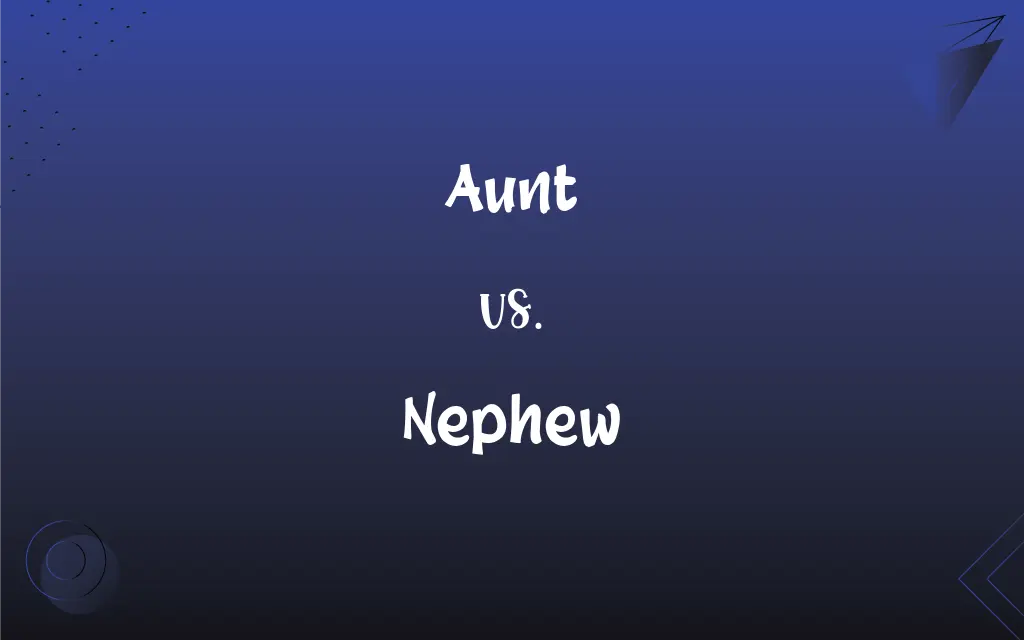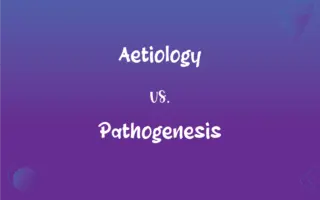Aunt vs. Nephew: What's the Difference?
Edited by Aimie Carlson || By Janet White || Updated on September 26, 2023
An aunt is a sister of one's parent, while a nephew is the son of one's sibling or sibling-in-law.

Key Differences
The term "aunt" refers to the sister of one’s parent or the wife of one's uncle, establishing a relationship that is vertical in a family tree, connecting different generations. It’s a title that implies a level of kinship and, in many cultures, is associated with respect and familial bonding. On the other hand, a "nephew" is the son of one’s brother or sister, or the son of one’s brother-in-law or sister-in-law. This term denotes a horizontal relationship within the family structure, linking individuals of the same generation.
"Aunt" and "nephew" hold distinctive places in the familial hierarchy. An aunt usually has a role of guidance, support, and affection towards her nephews and nieces, often serving as a secondary caregiver or a close confidant within the family dynamic. Contrarily, a nephew typically shares a bond of affection and respect with his aunt, enriching the familial ties with mutual love and understanding, but does not hold a guiding or caregiving role in relation to his aunt.
In terms of familial proximity, an aunt is directly related to one's parents, representing a connection through blood or marriage to one’s immediate family. The role of an aunt is often underscored by familial affection and, occasionally, responsibility, depending on the familial context and individual relationships. In contrast, a nephew signifies a relationship extended through one’s siblings, encompassing both the closeness of immediate family and the extended nature of the relationship. The relationship with a nephew usually involves a sense of protectiveness and endearment from the older family members.
Addressing the perspective of familial lineage, an aunt is recognized as a part of one’s extended family, originating either from the paternal or maternal side, depending on whether she is a sister to one’s mother or father, or married into the family. A nephew, however, is more directly connected to one’s immediate family lineage, descending directly from one’s siblings, and thereby sharing a more immediate blood relation or a relation through sibling’s marriage.
In essence, the concept of "aunt" and "nephew" are crucial in understanding family structures and relationships. The term "aunt" encompasses a relationship of support and guidance, often extending beyond immediate family boundaries, whereas the term "nephew" represents a relationship of affection and lineage within the family tree, emphasizing the bonds shared within a generation.
ADVERTISEMENT
Comparison Chart
Relation
Sister of one’s parent or wife of one's uncle.
Son of one’s sibling or sibling-in-law.
Role
Often serves a role of guidance, support, and affection.
Does not hold a guiding or caregiving role.
Generational
Belongs to a different generation than nephews/nieces.
Belongs to the same generation as cousins.
Familial Line
Connected through blood or marriage to immediate family.
More directly connected through siblings.
Proximity
Directly related to one's parents.
Related through one’s siblings.
ADVERTISEMENT
Aunt and Nephew Definitions
Aunt
An aunt can also be the wife of one’s uncle.
My uncle’s wife, my aunt, is a renowned chef.
Nephew
A nephew is the son of one’s brother-in-law or sister-in-law.
I bought a gift for my sister-in-law's son, my nephew.
Aunt
An aunt is the sister of one’s parent.
My aunt on my mother's side is very artistic.
Nephew
A nephew is part of one’s immediate family lineage.
My nephew, being a part of our immediate family, resembles us in many ways.
Aunt
An aunt is often a secondary caregiver in the family.
Whenever my parents are busy, my aunt takes care of me.
Nephew
A nephew is the son of one’s sibling.
My brother’s son, my nephew, is starting school this year.
Aunt
An aunt is part of one’s extended family.
I am looking forward to meeting my aunt at the family reunion.
Nephew
A nephew shares a bond of affection and respect with his aunts and uncles.
My nephew always shows great respect towards his aunt.
Aunt
An aunt can be related by blood or marriage.
My aunt, who is related by marriage, is very kind to me.
Nephew
A nephew belongs to the same generation as his cousins.
My nephew enjoys playing with his cousins at family gatherings.
Aunt
The sister of one's father or mother.
Nephew
A son of one's brother or sister or of the brother or sister of one's spouse.
Aunt
The wife of a sibling of one's mother or father.
Nephew
A son of one's sibling, brother-in-law, or sister-in-law; either a son of one's brother (fraternal nephew) or a son of one's sister (sororal nephew).
Aunt
Used as a form of address for an older woman, especially by children.
Nephew
A son of one's cousin or cousin-in-law
Aunt
The sister or sister-in-law of one’s parent.
Nephew
(archaic) A son of one's child.
Aunt
The female cousin or cousin-in-law of one’s parent.
Nephew
A grandson or grandchild, or remoter lineal descendant.
But if any widow have children or nephews [Rev. Ver. grandchildren].
If naturalists say true that nephews are often liker to their grandfathers than to their fathers.
Aunt
(affectionate) A woman of an older generation than oneself, especially a friend of one's parents, by means of fictive kin.
Nephew
A cousin.
Aunt
(obsolete) Any elderly woman.
Nephew
The son of a brother or a sister, or of a brother-in-law or sister-in-law.
Aunt
(obsolete) A procuress or bawd.
Nephew
A son of your brother or sister
Aunt
The sister of one's father or mother; - correlative to nephew or niece. Also applied to an uncle's wife.
Aunt
An old woman; and old gossip.
Aunt
A bawd, or a prostitute.
Aunt
The sister of your father or mother; the wife of your uncle
FAQs
Can an aunt be younger than a nephew?
Yes, it is possible for an aunt to be younger than a nephew.
Can a nephew have an aunt from both paternal and maternal sides?
Yes, a nephew can have aunts from both paternal and maternal sides of the family.
Do the terms aunt and nephew imply a specific age group?
No, the terms aunt and nephew do not imply any specific age group.
Is a nephew always a direct blood relative?
A nephew can be a direct blood relative or related through a sibling’s marriage.
Is an aunt necessarily a blood relative?
No, an aunt can be related by marriage as well, being the wife of one's uncle.
Can an aunt be a primary caregiver to a nephew?
Yes, depending on family circumstances, an aunt can be a primary caregiver to a nephew.
Can a nephew be older than his aunt?
Yes, it is possible for a nephew to be older than his aunt.
Is the relationship between an aunt and a nephew considered immediate family?
It is generally considered extended family, but the nephew is more immediate to the siblings.
Is the relationship between an aunt and a nephew legally significant?
The relationship can have legal significance, particularly in matters of inheritance or guardianship.
Can the term aunt and nephew be used to describe step-relations?
Yes, the terms can be used to describe step-relations, depending on individual family dynamics.
Can a nephew have more than one aunt?
Absolutely, a nephew can have multiple aunts from both sides of the family.
Do aunts and nephews usually share a close bond?
The bond between aunts and nephews can vary greatly, but they often share a close bond.
Can an aunt be a guardian to her nephew?
Yes, depending on family circumstances and legal arrangements, an aunt can be a guardian to her nephew.
Can the terms aunt and nephew apply to adopted family members?
Yes, the terms aunt and nephew can apply to adopted family members.
Do all cultures recognize the terms aunt and nephew?
While the concept is universally recognized, specific terms and recognition can vary across cultures.
About Author
Written by
Janet WhiteJanet White has been an esteemed writer and blogger for Difference Wiki. Holding a Master's degree in Science and Medical Journalism from the prestigious Boston University, she has consistently demonstrated her expertise and passion for her field. When she's not immersed in her work, Janet relishes her time exercising, delving into a good book, and cherishing moments with friends and family.
Edited by
Aimie CarlsonAimie Carlson, holding a master's degree in English literature, is a fervent English language enthusiast. She lends her writing talents to Difference Wiki, a prominent website that specializes in comparisons, offering readers insightful analyses that both captivate and inform.































































